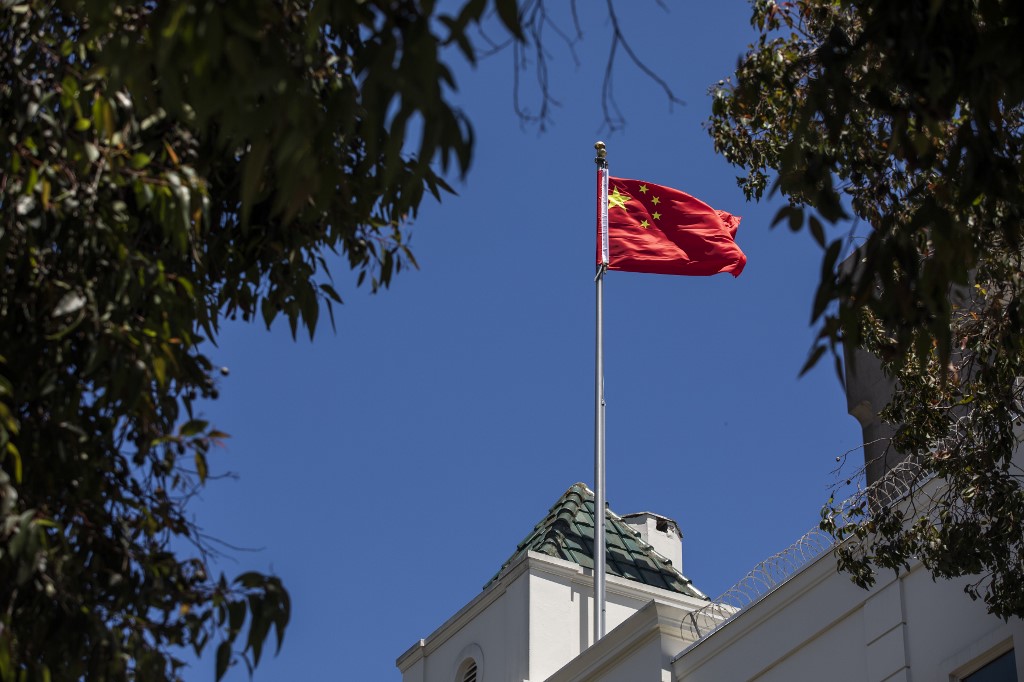US indicts four China researchers accused of hiding military ties

The flag of the People’s Republic of China flies in the wind above the Consulate General of the People’s Republic of China in San Francisco, California on July 23, 2020. (Photo by Philip Pacheco / AFP)
The US Justice Department announced Thursday the indictments of four Chinese researchers it said lied about their ties to the People’s Liberation Army, with one escaping arrest by taking refuge in the country’s San Francisco consulate.
The department said the four are part of a Chinese effort to “infiltrate” US institutions to gain scientific and technological knowledge.
“This is another part of the Chinese Communist Party’s plan to take advantage of our open society and exploit academic institutions,” said Assistant Attorney General John Demers.
Before the announcement Thursday, Beijing condemned reports of the charges as “naked political persecution.”
The US government “has continually monitored, harassed and even arbitrarily detained Chinese students and scholars in the US, and accused Chinese scholars on the presumption of guilt,” Foreign Ministry spokesman Wang Wenbin said.
Article continues after this advertisement“China will take necessary measures to safeguard Chinese citizens’ safety and legitimate rights.”
Article continues after this advertisementResearch in US universities
All four face up to 10 years in prison and $250,000 fines for visa fraud.
The cases come amid boiling trade, military and diplomatic tensions between Washington and Beijing.
The United States is cracking down on what it says is a drive by Beijing to obtain US scientific and industrial secrets to bolster its own technological capabilities and economic strengths.
Three of the researchers, Song Chen, Wang Xin and Tang Juan were charged in recent weeks in California, where all had been undertaking scientific and medical research at prominent universities.
Song and Wang were arrested and remain in custody, while Tang, the FBI said, made her way to the San Francisco consulate to avoid arrest.
A fourth, Zhao Kaikai, a graduate student studying artificial intelligence at Indiana University, was arrested last week in Indiana.
Officials and court filings said all had lied on visa applications about their ties to the PLA and Chinese Communist Party.
Tang was a cancer treatment researcher at University of California-Davis who arrived in the United States on December 27, 2019.
Song was conducting neurological research at Stanford and has been in the country since December 2018.
Wang, who also arrived in December 2018, had been doing research at the University of California-San Francisco.
The Justice Department said it had been verifying the status of visiting Chinese researchers in 25 US cities and interviewing them about possible PLA and Communist Party ties.
It found pictures of Tang in uniforms with insignia for the PLA “civilian cadres,” and information describing her an associate researcher at a Chinese Air Force hospital.
In a search of her apartment in Davis, California, the FBI said they found documents indicating she was a member of the Chinese Communist Party.
In Song’s case, they said she falsely claimed that she had ended her service in the PLA in 2011, but actually continued to work at an Air Force university.
Wang was arrested on June 11 at Los Angeles International Airport as he sought to leave the country.
The Justice Department accused him of not being fully truthful about his ongoing position as a PLA professor of medicine. They also accused him of sending research from his US host back to China.
The FBI said Zhao served in the National University of Defense Technology, the PLA’s leading science research university, and had attended the Chinese Air Force’s elite Aviation University.
Rising tensions
In September 2019, US officials arrested a Chinese man, Liu Zhongsan, in New Jersey on charges he was helping other Chinese fraudulently obtain US student and researcher visas.
The Justice Department said Liu’s operation was aimed at bringing in Chinese who would recruit US citizens to work in Chinese research programs.
This US this week ordered China to shut its consulate in Houston, with Secretary of State Mike Pompeo on Thursday calling it “a hub of spying and intellectual property theft.”
“These activities have increased markedly in scale and scope over the past few years,” the State Department said.